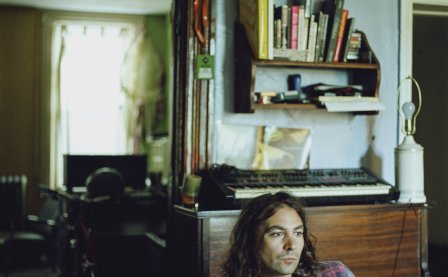I need to remind myself to actually envision my best-case scenarios before getting into indiscriminate moniker-gobbling. Because, really, The War on Drugs had nowhere else to go, especially after that drone-yeti Kurt Vile started making a weird, endless game out of pillaging classic rock clichés. Before all that, we had Wagonwheel Blues, a record whose quirky rambles and blissful white-noise-outs were both idiosyncratic and comforting. It was a record easy to cherish to the point of total addiction. A friend recommended them as “Springsteen or Dylan backed by Yo La Tengo or Pavement.” I listened, and concurred, with glee: at the time, drawing and quartering the DIY group to these diametric giants felt violent and roguish, like running your finger down a knife blade. It didn’t matter that The War on Drugs were a year or two late for the Boss nova, because they were clearly staking some significant ground for themselves. I suppose the band read their own reviews; Vile took off and went solo haywire; they’re now “mature”; I no longer feel roguish, and part of me wants to make it someone else’s problem.
But I mean, these things happen for chrissakes. Like The National (or anyone else), The War on Drugs have officially found their sound, and you know that they know it when after a Wurlitzer minute they slam into “Baby Missles.” It’s a far tighter Springsteen homage than “A Needle in Your Eye #16,” not to mention Adam Granduciel is now all low and plosive-dense. Granduciel’s voice, which used to drift and tumble through whatever asymmetric phrasing it wanted, is the clearest compromise on the album, though the compromises basically shift from track to track. “Brothers” is no-duh-Dylan over the kind of buffed acoustic strums that would’ve melted into anything else in previous work. Even the tape-thickened “A Pile of Tires” manages the miraculous feat of replicating Wagonwheel’s tacked-on closer “A Barrel of Batteries” without seeming out of place amongst their cleanest material yet. A lot of these are changelings, to be sure, but plenty of acts like Califone (and YLT) have gone a long ways writing their own greatest hits albums. Besides, Future Weather is an EP; it’s naturally taut and brilliantly sequenced.
As successful as the don’t-matter-no-more lyrics (a lot of stuff about friends, but none of them are chasing squirrels) and pinpoint-precise chord changes are, the best parts of the EP reveal that The War on Drugs remain fascinated by sheer sound. The brief “Missles Reprise” might be the best track on here, an enormous, churning sine wave of a guitar and wallops so distant and echo-laden your mind just has to infer the incredible Bossy momentum buried within. Bizarre how easily one gets comfortable with the Springsteen reference point; however, anyone who’s too comfortable is sure to get thrown for a loop at the breaking point of “The History of Plastic,” when a polyrhythmic mess of tambourines and cabasas flocks into the song.
It’s constant enough to move the song along, but weird enough to put you on edge, which is exactly the sort of balance The War on Drugs struck without thinking on Wagonwheel. Part of me wishes they’d screw with us a little more, but I’m also wowed at how damned deliberate they are all of a sudden. They’re making music like they’re soldiers, part of an undying movement, no longer just some band some of us happen to know about. I say bring on the stadiums and college radio playlists, and more power to ‘em.
More about: The War on Drugs




